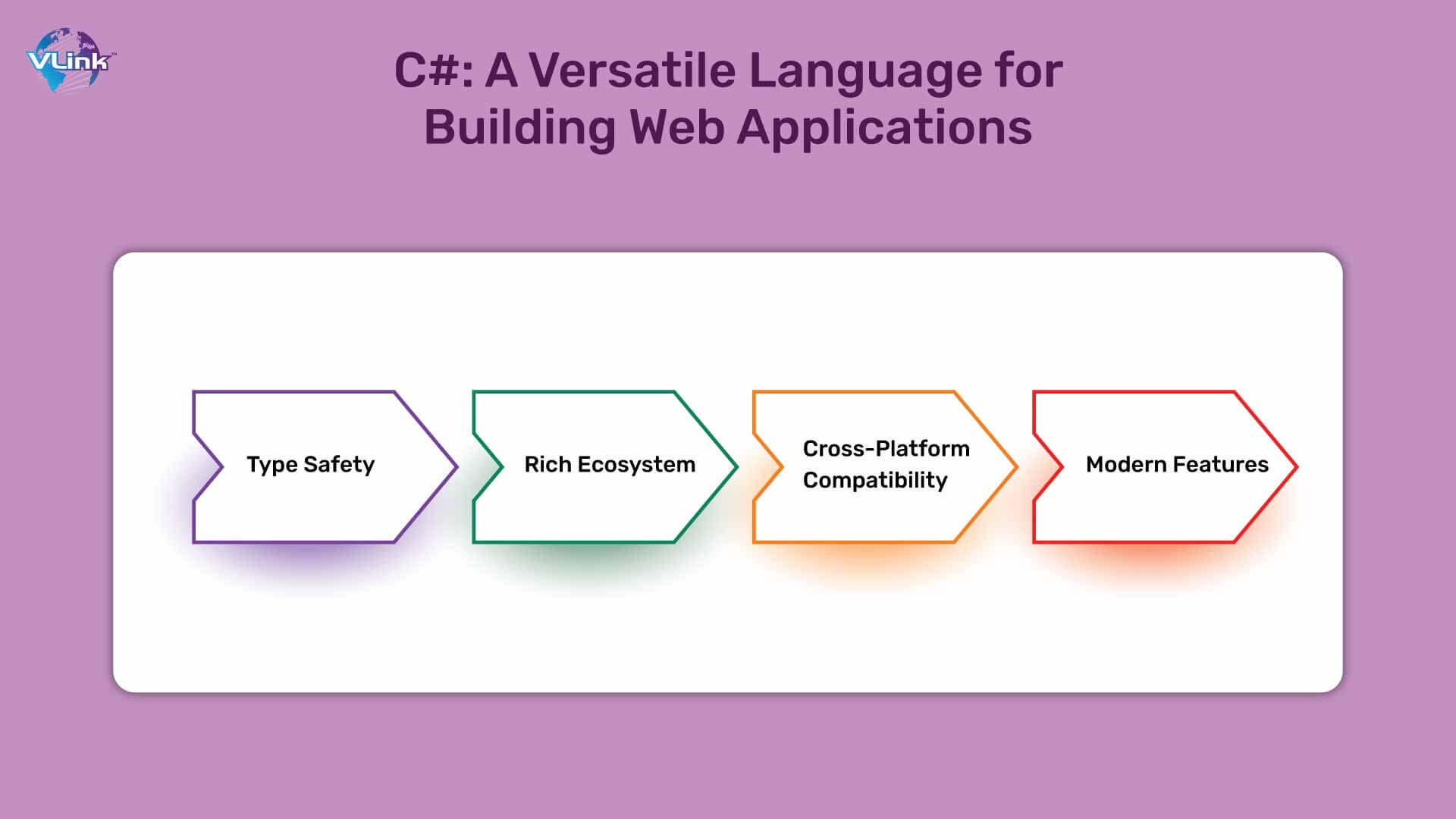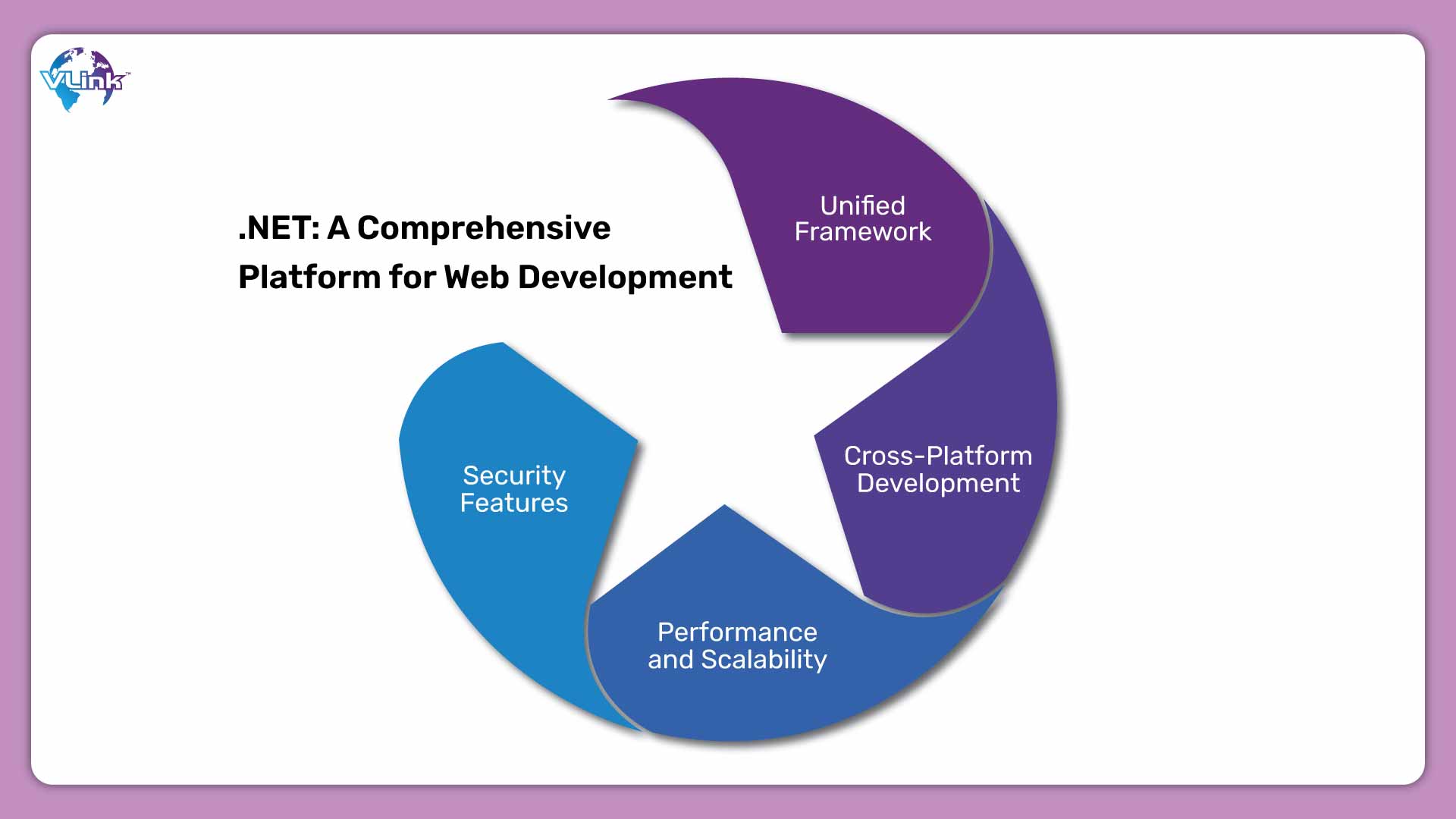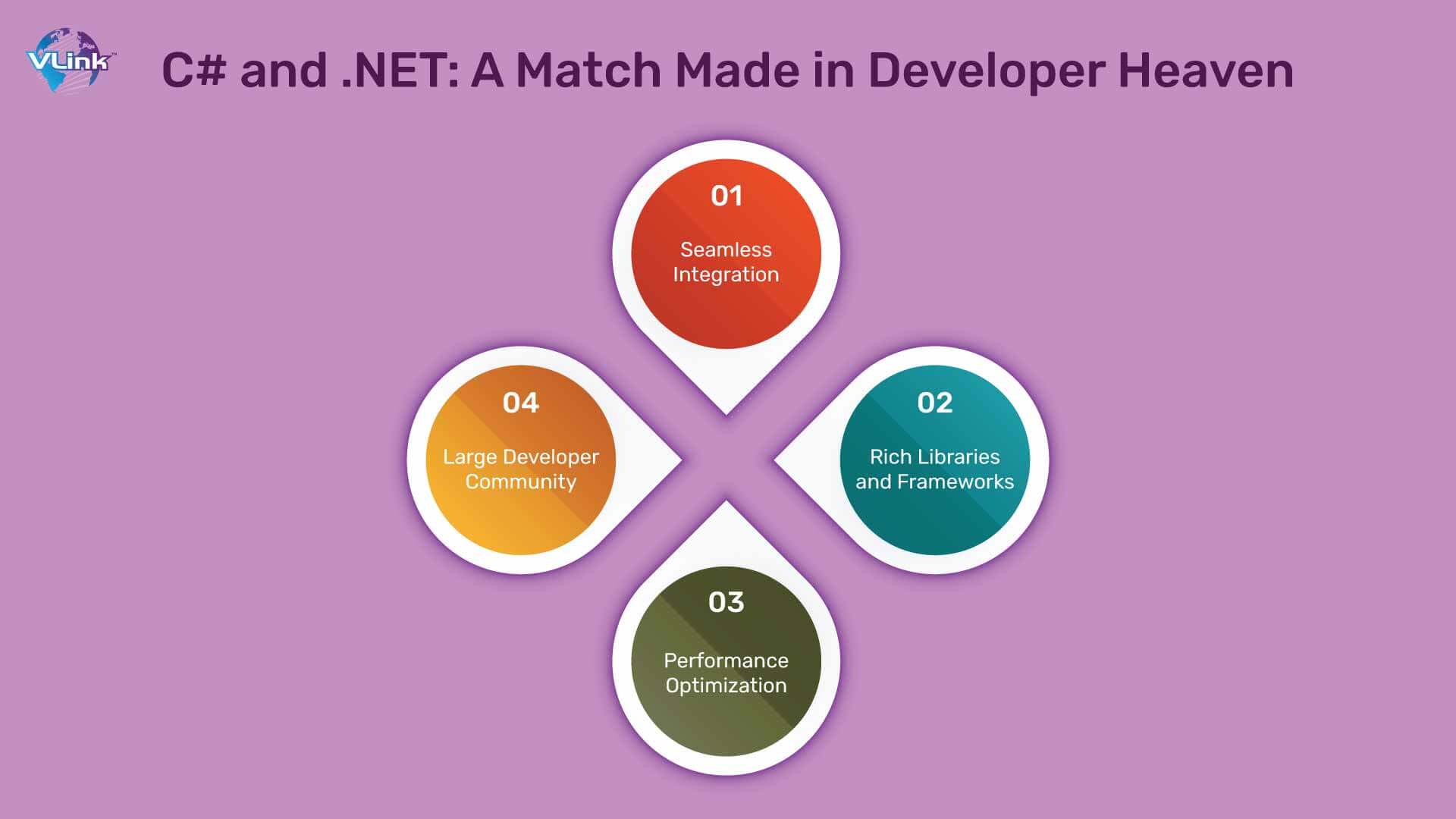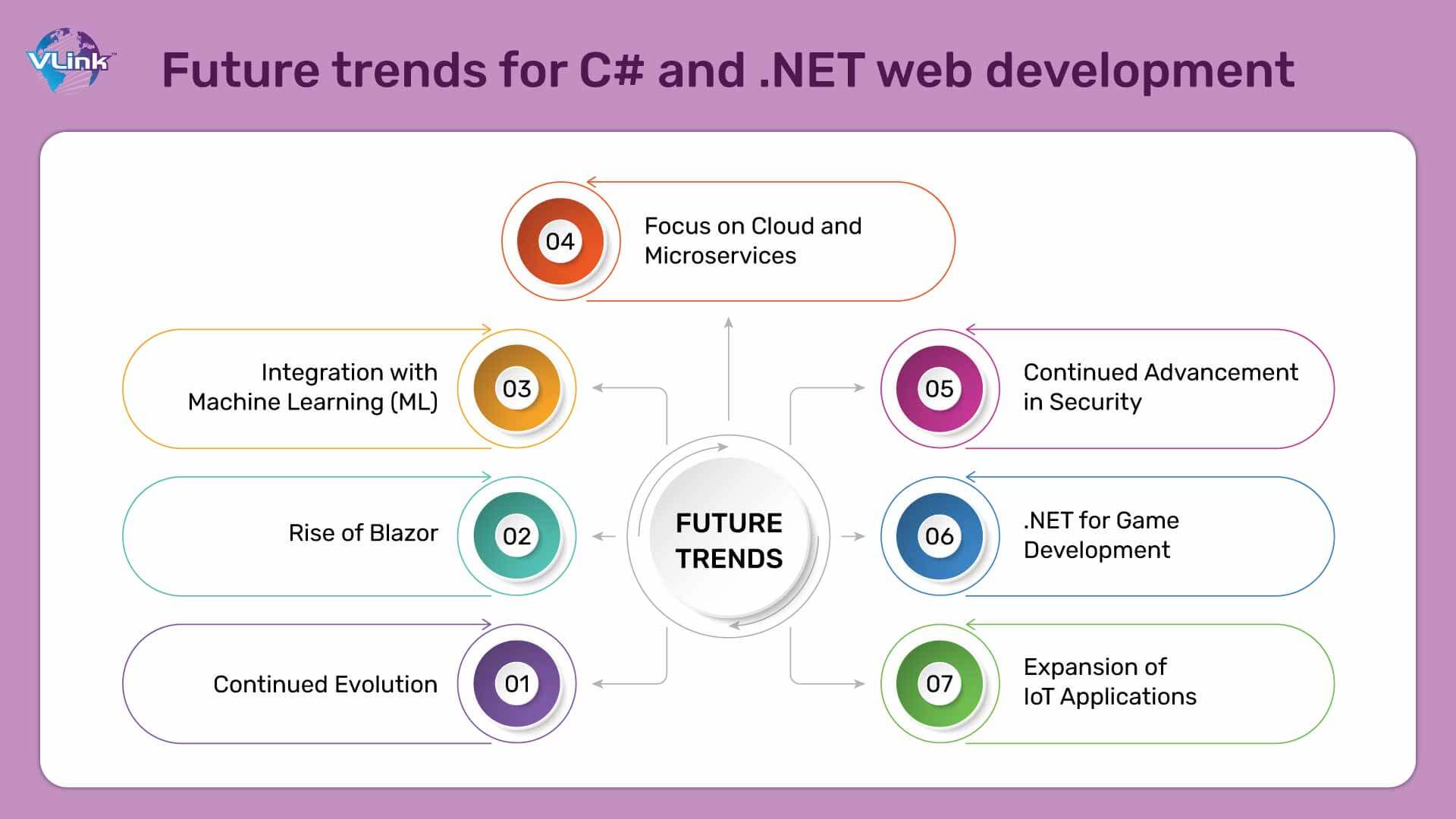The ever-evolving landscape of web development demands continuous innovation in the quest for efficient, scalable, and secure solutions. In this relentless pursuit, two powerhouses - C# and .NET - have emerged as a formidable duo, empowering developers to craft exceptional web applications.
This comprehensive blog delves into the intricate workings of this synergistic partnership, exploring the individual strengths of C# and .NET and their combined magic in building cutting-edge web experiences.
C#: A Versatile Language for Building Web Applications

C#, a general-purpose, object-oriented programming language developed by Microsoft, has become a popular choice for web development due to its:
Type Safety:
Unlike dynamically typed languages, C# enforces strict typing. This ensures code clarity, reduces runtime errors, and enhances maintainability. By explicitly declaring variable types, developers can identify potential issues early in development, leading to more robust and reliable applications.
Rich Ecosystem:
C# boasts a vast ecosystem of libraries and frameworks like ASP.NET, Entity Framework, and Blazor. These readily available components offer pre-built functionalities for various development needs, accelerating the development process by providing essential functionalities without requiring developers to reinvent the wheel. Popular libraries like ASP.NET MVC and ASP.NET Core Razor Pages streamline the development of web applications with different architectural patterns, while Entity Framework simplifies data access and manipulation.
Cross-Platform Compatibility:
While traditionally targeting the .NET Framework, C# now seamlessly integrates with .NET Core, enabling cross-platform development for Windows, macOS, and Linux. This flexibility allows developers to build applications running on various operating systems, expanding their potential reach and user base. Hired Developers can choose the platform that best suits their project's needs and target audience without worrying about compatibility issues.
Modern Features:
C# continuously evolves, incorporating asynchronous programming, lambda expressions, and null-conditional operators to streamline development and enhance code readability. These modern features allow developers to write cleaner, more concise, and efficient code, improving the overall development experience and application performance. Asynchronous programming enables efficient handling of asynchronous tasks. At the same time, lambda expressions provide a straightforward way to define anonymous functions, and null-conditional operators offer a safer way to access properties on potentially null objects.
These attributes position C# as a powerful and versatile language for building web applications. Its type safety ensures code clarity and reduces errors, the rich ecosystem accelerates development, cross-platform compatibility expands reach, and modern features streamline the development process.
Read More: Top 10 Trending Frameworks for Web App Development
.NET: A Comprehensive Platform for Web Development

.NET, a free and open-source framework developed by Microsoft, provides a comprehensive platform for building and deploying diverse applications, including web applications. Here's how it empowers web development:
Unified Framework:
.NET Core, the modern iteration of .NET, offers a unified framework encompassing web APIs and applications. This eliminates the need for developers to learn and manage separate frameworks for different aspects of their web applications, simplifying development and deployment. Dot Net Developers can use the same framework and tools to build both the backend logic and the user interface of their web application, leading to a more cohesive development experience.
Cross-Platform Development:
.NET Core applications can run seamlessly on various platforms like Windows, macOS, and Linux. This eliminates vendor lock-in and fosters broader deployment options. Developers can choose the platform that best suits their needs and target audience without worrying about compatibility issues. This flexibility allows developers to deploy their applications on the platform that best meets their specific requirements and target audience, whether it's a cloud environment, an on-premise server, or a combination of both.
Performance and Scalability:
.NET is renowned for its performance optimization and scalability capabilities, allowing web applications to handle increasing traffic demands efficiently. Features like Just-In-Time (JIT) compilation and garbage collection contribute to efficient memory management and execution, leading to faster applications that can scale to meet growing user demands.
Security Features:
Built with robust features, .NET empowers developers to create secure web applications by mitigating vulnerabilities and protecting sensitive data. Features like authentication, authorization, and encryption help safeguard against common security threats, providing peace of mind for developers and users alike. These built-in security features help developers implement robust security measures without writing complex code from scratch.
These features make .NET a powerful and versatile platform for building modern web applications. Its unified framework simplifies development; cross-platform capabilities expand reach, performance, and scalability, ensure smooth operation and robust security features protect user data and applications.
Read More: Top 10 Frameworks and Tools to Build Progressive Web Apps
C# and .NET: A Match Made in Developer Heaven
 The synergy between C# and .NET creates an exceptional environment for web development, offering numerous advantages beyond their strengths. Such as:
The synergy between C# and .NET creates an exceptional environment for web development, offering numerous advantages beyond their strengths. Such as:
Seamless Integration:
C# code compiles and executes seamlessly within the .NET runtime environment, providing a smooth and efficient development experience. This tight integration eliminates complex configuration or compatibility concerns, allowing developers to focus on writing code and building applications without worrying about underlying infrastructure complexities.
Rich Libraries and Frameworks:
Dot NET offers a vast repository of pre-built libraries and frameworks specifically designed to work with C#, catering to diverse development needs and accelerating the development process. Popular options like ASP.NET MVC, ASP.NET Core Razor Pages, and Entity Framework provide functionalities for building various types of web applications, including model-view-controller (MVC) applications, single-page applications (SPAs), and data-driven applications.
These readily available components significantly reduce development time and effort by providing pre-built functionalities for everyday tasks, allowing developers to focus on the unique aspects of their applications.
Performance Optimization:
C# and .NET are optimized for performance, ensuring web applications run efficiently and deliver responsive user experiences. Just-In-Time (JIT) compilation in .NET translates code into machine code at runtime, leading to faster execution.
Additionally, the garbage collection mechanism in C# automatically manages memory allocation and deallocation, preventing memory leaks and improving application performance.
Large Developer Community:
C# and .NET boast a vast and active developer community, providing readily available resources, support, and best practices for developers. This vibrant community offers various benefits, including:
- Extensive documentation and tutorials: The community provides comprehensive documentation and tutorials that cater to developers of all experience levels, offering valuable resources for learning and troubleshooting.
- Open-source libraries and frameworks: The community contributes to a vast ecosystem of open-source libraries and frameworks that extend the capabilities of .NET and C#, offering developers additional functionalities and customization options.
- Online forums and communities: Online forums and districts provide a platform for developers to connect, share knowledge, seek help, and learn from each other's experiences. This collaborative environment fosters continuous learning and problem-solving within the developer community.
Read More: Web Development with Go: Building Scalable and Efficient Web Applications
Examples of Modern Web Applications Built with C# and .NET
Stack Overflow:
This popular question-and-answer platform for programmers is built using ASP.NET MVC and C#, showcasing the scalability and performance capabilities of the duo.
Microsoft Office Online:
The web-based versions of popular applications like Word, Excel, and PowerPoint leverage .NET and C# to deliver a familiar user experience while leveraging the benefits of cloud-based deployments.
Skype:
This widely used communication platform utilizes C# and .NET for its backend services, ensuring reliable and efficient communication for millions of users worldwide.
Microsoft Azure:
A cloud computing platform that offers various services like storage, computing, and analytics. With the necessary tools and frameworks, you can quickly build, run, and manage applications across multiple clouds, on-premises, and at the edge.
Other Apps:-
- Skype: A video chat and messaging application.
- Yelp: A crowd-sourced platform for local business reviews.
- Duolingo: A language learning application.
These are just a few examples, and the possibilities are vast. C# and .NET empower developers to build a wide range of web applications, from simple static websites to complex enterprise applications with real-time features and intricate functionalities.
Future trends for C# and .NET web development

The future of C# and .NET web development looks bright, with several trends shaping the landscape:
1. Continued Evolution:
The .NET 6 framework, released in November 2021, is expected to remain the foundation for future development. It offers improved performance, cross-platform support, and a modern development experience. We can anticipate further enhancements and new features in subsequent versions.
2. Rise of Blazor:
Blazor, a framework allowing C# code to run in the browser, is gaining traction. This enables developers to create rich interactive web UIs using C# instead of relying solely on JavaScript. Expect to see wider adoption of Blazor for building Progressive Web Applications (PWAs) that offer native app-like experiences on the web.
3. Integration with Machine Learning (ML):
ML.NET, a library for building and deploying ML models within .NET applications, is gaining popularity. This trend signifies the increasing role of ML in web development, allowing C# developers to incorporate intelligent features into their web applications.
4. Focus on Cloud and Microservices:
Cloud adoption for .NET development is expected to grow, with Azure being a natural choice for many developers. This trend aligns with the growing popularity of microservices architecture, where large applications are broken down into smaller, independent services, making them easier to manage and scale in the cloud.
5. Continued Advancement in Security:
Security will remain a top priority for .NET development as cyber threats evolve. We expect continuous improvements in the .NET security framework, offering robust protection against vulnerabilities and potential attacks.
6. .NET for Game Development:
With the power and versatility of C#, there's a growing interest in using .NET for game development. This trend opens up new possibilities for creating high-quality games with the familiarity and benefits of the .NET ecosystem.
7. Expansion of IoT Applications:
The Internet of Things (IoT) is expected to grow significantly in the coming years. .NET is well-positioned to play a role in this space, offering frameworks and libraries for building applications that interact with various IoT devices and sensors.
Overall, C# and .NET web development is dynamic and evolving. Staying informed about these trends will be crucial for developers to stay ahead of the curve and build robust, future-proof web applications.
Hence, with the combined power of C# and .NET, developers can build innovative and effective web applications that meet the ever-growing demands of the modern web. Whether you're a seasoned professional or just starting your development journey, C# and .NET offer a powerful and versatile toolkit to equip you with the skills and knowledge to create exceptional software solutions.
Read More: 8 Tips to Improve Your Website’s Speed & Performance
Conclusion
C# and .NET, individually powerful tools, become an unstoppable force when combined. Their strengths complement each other, offering developers a robust, versatile, and secure environment to build the next generation of web applications.
From simple websites to complex enterprise applications, this dynamic duo empowers developers to create exceptional user experiences, ensure scalability and security, and thrive in the ever-evolving web development landscape.
Ready to take the next step?
Contact us to learn more about how C# and .NET development services can empower your organization to build innovative and future-proof solutions. Our team of experienced developers and consultants can guide you through the entire process, from project conceptualization to implementation and maintenance. Together, let's leverage the power of C# and .NET to unlock new possibilities and create a lasting impact in the digital age.









 Shivisha Patel
Shivisha Patel

















